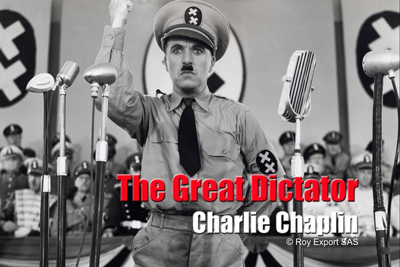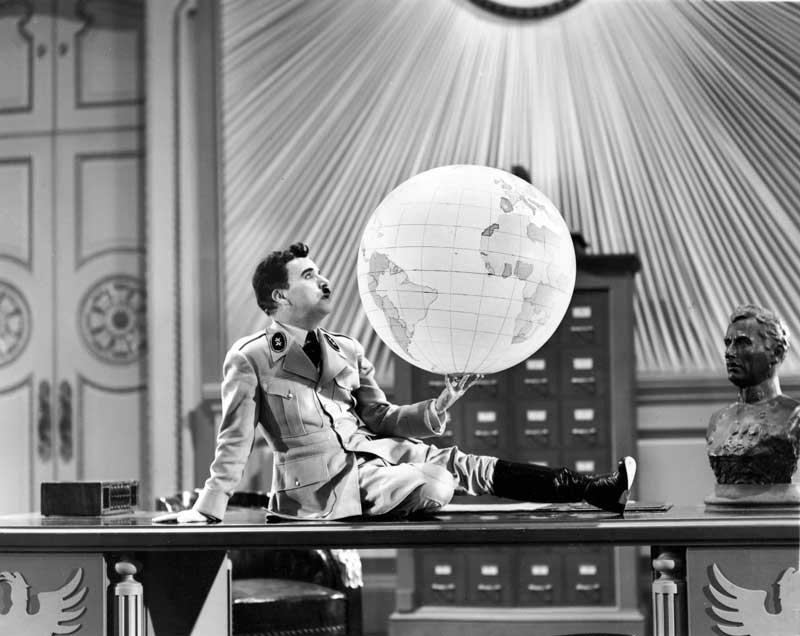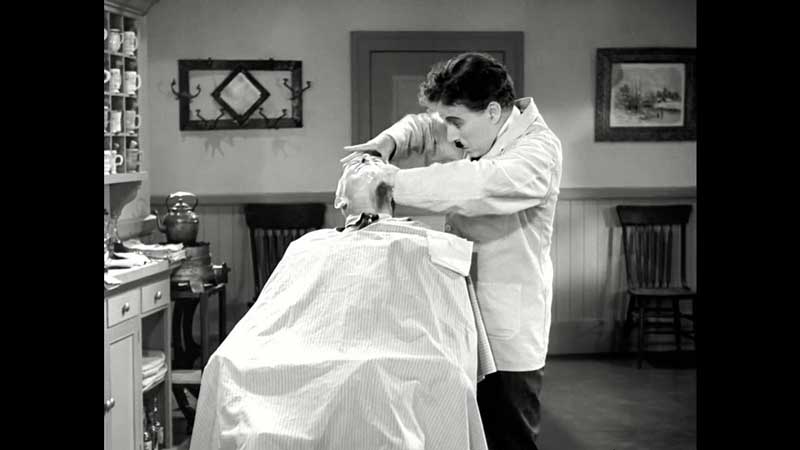
The Great Dictator (1940), the bold and controversial wartime parody with its social and political commentary, in which Charlie Chaplin delivered spoken lines for the first time in a film, after long 13 years of the advent of sound in the movies, was also his last film with the Little Tramp character, as well as the first film whose entire script was prepared in advance. It was also one of the first Hollywood films to combat Anti-Semitism and Chaplin’s most successful film at the box office, although it caused him great trouble and indirectly lead to his long exile from the States.
In the film, Chaplin appeared as a Jewish barber with a toothbrush moustache, resembling the features of the fascist leader named Adenoid Hynkel, who turned into the dictator of Tomania, signifying the character of Adolf Hitler, while the other two characters in the film, Garbitsch and Herring were modelled after the powerful Nazi leaders Joseph Goebbels and Hermann Wilhelm Göring. Italy’s fascist dictator, Benito Mussolini was also satirically portrayed in the film as Napoloni, the dictator of the neighbouring country of Bacteria.

The Great Dictator was released in the middle of October 1940, more than a year before the United States entered into World War II in the late1941, in which Charlie Chaplin appeared in two roles, the cruel and clownish dictator of Tomania and the simple and the kindly Jewish barber who was mistaken for him and offered a caricature of Adolf Hitler and a sly tweaking of his comic presence. It was a political satire, faintly veiled mocking of world conditions. Naturally, Hitler did not like the film and banned it in Germany and in all the countries occupied by the Nazis.
It was also banned in Spain, Italy and neutral Ireland for its mockery of Hitler. However, during that time, most Americans had no idea about the prevailing situation in Europe and Hitler was not yet recognized as an enemy or an embodiment of evil and before the knowledge of the Holocaust, the isolationist forces in America preached a policy of nonintervention in the troubles of Europe.

The plot of the film is centred on an unnamed Jewish barber soldier on the western front in 1918, fighting for the Centre Power Nation of Tomania, who valiantly saved the life of a wounded pilot, Commander Schultz, without knowing that he was an enemy. However, after the crash-landing of their plane into a tree, due to shortage of fuel, the barber suffered loss of memory and was carried off to a hospital.
After spending 20 years of his life in the hospital and unaware of the political changes in the country, the barber returned to his barber shop, located in a ghetto in the country of Tomania, only to discover that Hynkel became the dictator of Tomania and was ruthlessly persecuting the Jews with the help of his two ministers, Garbitsch and Herring.

Back in the ghetto, the barber fell in love with the maid Hannah and together they tried to resist oppression by the military forces. But one day, while the stormtroopers of the dictator were moving through the ghetto, smashing windows and rounding up Jews, the barber was captured by them and as they were about to hang him on the spot, his life was saved by Schultz, now an official of the dictator, who recognized him as the saver of his life and helped the barber to regain his memory.

Meanwhile, with the intention to arrange funding for his ever-growing military forces, Dictator Hynkel tried to borrow some money from a Jewish banker called Hermann Epstein, which led to a temporary ease on the restrictions on the ghetto. But as the banker ultimately refused to lend him the money, Hynkel became furious and ordered a purge of the Jews and as Schultz protested against his inhumane policy, Hynkel did not hesitate to send him to a concentration camp. However, Schultz managed to escape from the camp to take shelter in the ghetto, where the barber lived. There, in the ghetto, Schultz tried to persuade the Jewish family to assassinate Hynkel in a suicide attack, but they are dissuaded by Hannah and eventually, Schultz and the Barber were arrested and sent to a concentration camp, while Hannah and her family flee to freedom at a vineyard in the neighbouring country of Osterlich.

However, by that time, Hynkel was having a dispute with Napaloni, the dictator of Bacteria, obviously modelled on Mussolini, over the issue whether Tomania or Bacteria should invade the neighbouring Osterlich. Soon, the discussion became hot and descended into a ridiculous food fight, which was resolved when both men tasted the hot mustard and were shocked into cooperating. However, immediately after signing the treaty with Napaloni, Hynkel ordered the invasion of Osterlich, as a result of which Hannah and her family were trapped by the invading force.

As luck would have it, one day after a boating mishap while duck hunting in civilian cloth, Hynkel was mistaken for the Barber and was locked in the camp, while the barber escaped, dressed in Hynkel’s uniform, along with Schultz. Soon they arrived at the Osterlich frontier, where a victory parade crowd was waiting to be addressed by Hynkel. The barber never delivered a speech, but as advised by Schultz, he had no other choice but to go to the platform and address to the public impersonating Hynkel, the only way to save their lives once they reach the capital of Osterlich. The barber took his time to deliver the speech as Hynkel and openly declared that he had a change of heart. After that, he delivered an impassioned speech for brotherhood and goodwill, encouraging soldiers to fight for liberty and unite the people in the name of democracy, which was appreciated by the crowd. Lastly, he addressed a message of hope to Hannah, which she heard on the radio and turning towards the rising sunlight, asked her fellows to hear the message of hope.

The Great Dictator (1940) won five Oscar nominations, for picture, actor, supporting actor, screenplay and music. But it was felt by the public, as well as by the critics that the film came to a dead end when the barber, impersonating Hynkel, delivered a monologue of more than three minutes, which represented Chaplin's own views. That climactic monologue of Chaplin in the film is considered by many as perhaps the greatest monologue in film history, and possibly the most poignant recorded speech of the 20th century